
MINDS AND MACHINES
Scope & Guideline
Navigating the Complexities of Mind and Machine
Introduction
Aims and Scopes
- Ethics of Artificial Intelligence:
The journal consistently publishes research analyzing the ethical implications of AI technologies, examining issues like fairness, accountability, and the moral responsibilities of AI systems. - Cognitive Science and AI:
A significant focus on understanding the cognitive processes involved in AI, including how machines can mimic human reasoning, learning, and decision-making. - Sociotechnical Perspectives:
Exploration of the interplay between technology and society, emphasizing how AI systems affect social structures, human behavior, and governance. - Interdisciplinary Approaches:
The journal encourages interdisciplinary studies that bridge philosophy, computer science, psychology, and other fields to provide a holistic view of AI's impact. - Interpretability and Explainability:
A core area of research is dedicated to making AI systems more transparent and understandable, ensuring that users can comprehend AI decision-making processes. - Human-Machine Interaction:
Investigation of the dynamics between humans and AI, including the implications of autonomy, trust, and the role of AI in enhancing human capabilities.
Trending and Emerging
- Generative AI and Ethics:
There is a growing focus on the ethical implications of generative AI technologies, particularly in relation to content creation, misinformation, and societal impact. - AI in Healthcare:
Research exploring the application of AI in healthcare is trending, emphasizing its potential benefits and ethical considerations in patient care and medical decision-making. - Sociotechnical AI Frameworks:
Emerging themes emphasize the need for sociotechnical frameworks that address vulnerabilities and challenges in AI deployment across various contexts. - Algorithmic Fairness and Bias:
An increased emphasis on understanding and mitigating bias in AI systems, particularly in decision-making contexts, reflects a broader societal concern for equity and justice. - Human Autonomy and AI Influence:
There is a rising interest in examining how AI systems affect human autonomy, decision-making, and the potential risks posed by increased reliance on automated systems.
Declining or Waning
- Technical Aspects of AI Development:
Research focusing solely on the technical specifications and advancements of AI technology has diminished, with a shift towards more ethical and philosophical discussions. - Purely Theoretical AI Models:
Papers that concentrate on abstract theoretical models of AI without practical implications or applications are less frequent, indicating a preference for applied research. - Historical Perspectives on AI:
There is a noticeable decrease in publications exploring the historical development of AI concepts, suggesting a move towards contemporary issues and future implications.
Similar Journals

Journal of Cognition and Culture
Illuminating the Intersections of Thought and TraditionThe Journal of Cognition and Culture, published by BRILL, stands as a pivotal resource in the fields of Cultural Studies, Social Psychology, and Experimental and Cognitive Psychology. With an ISSN of 1567-7095 and E-ISSN of 1568-5373, this scholarly journal has been contributing to the academic discourse since 2001 and continues to provide insights into the interplay between cognitive processes and cultural phenomena. Based in the Netherlands, it boasts impressive rankings, including Q2 in Arts and Humanities (Miscellaneous) and Q1 in Cultural Studies for 2023, reflecting its significance in addressing complex cognitive and cultural issues. Although it operates under a traditional access model, the journal's commitment to rigorous peer review and high-impact research ensures its relevance and authority in the field. Researchers, educators, and students alike will find the articles and studies published herein an invaluable addition to their understanding of how cognitive functions shape, and are shaped by, cultural contexts.
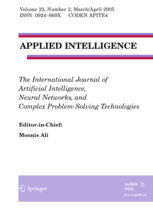
APPLIED INTELLIGENCE
Exploring innovative methodologies in intelligent systems.Applied Intelligence is a prominent peer-reviewed journal that has been instrumental in advancing the field of Artificial Intelligence since its inception in 1991. Published by Springer, a reputable name in academic publishing, the journal focuses on the innovative applications of intelligent systems, algorithms, and methodologies across various disciplines. With an impressive Q2 ranking in the Artificial Intelligence category for 2023, and a Scopus rank of #117 out of 350 in its field, Applied Intelligence is recognized for its significant contributions and rigorous standards. The journal is accessed primarily through subscription, ensuring that high-quality research reaches the academic community and industry professionals alike. Its commitment to disseminating cutting-edge research makes it an invaluable resource for researchers, practitioners, and students interested in the practical implications of AI advancements. Join a community dedicated to exploring the transformative power of artificial intelligence and stay ahead in this ever-evolving field!
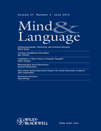
MIND & LANGUAGE
Connecting Ideas Across Linguistics, Philosophy, and CognitionMIND & LANGUAGE, published by WILEY, is a premier academic journal that has established itself as a leading platform for interdisciplinary research at the intersection of linguistics, philosophy, and cognitive science. With a noteworthy impact factor and a remarkable ranking in the top quartiles (Q1) for both Linguistics and Language as well as Philosophy, it reflects the journal’s robust contribution to the academic community, garnering attention from researchers and scholars worldwide. Since its inception in 1986, MIND & LANGUAGE has provided an avenue for exploring the complexities of language perception, cognitive processes, and the philosophical implications of linguistic studies. Its comprehensive scope ensures that it remains a critical resource for professionals and students alike who are engaged in the exploration of language's role in human thought and society. The journal's rigorous peer-review process guarantees the high quality and scholarly integrity of the published work, making it an essential addition to any academic library.
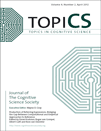
Topics in Cognitive Science
Innovating Insights into Human Thought and BehaviorTopics in Cognitive Science, published by WILEY, is a premier interdisciplinary journal that advances the understanding of the cognitive processes that underpin human behavior and interaction with technology. With a commendable impact factor and a strong focus on research from 2009 to 2024, this journal garners significant attention in various subfields, as evidenced by its Q1 ranking in Experimental and Cognitive Psychology and Linguistics and Language, alongside a Q2 position in Artificial Intelligence, Cognitive Neuroscience, and Human-Computer Interaction. Researchers and professionals will find invaluable insights into the latest experimental findings, theoretical discussions, and practical applications that bridge cognitive neuroscience, psychology, and computer science. Topics in Cognitive Science is especially pivotal for those aiming to delve deeper into cognitive mechanisms and their implications within our increasingly digital world, making it an essential resource for students and scholars alike.

Cognitive Computation and Systems
Exploring the Synergy of Algorithms and Cognition.Cognitive Computation and Systems is an innovative open-access journal published by Wiley, dedicated to advancing the fields of Artificial Intelligence, Cognitive Neuroscience, and Computer Science Applications. Based in the United Kingdom, this journal has established itself as a key resource for researchers, students, and professionals alike since its inception in 2019. With a focus on the convergence of cognitive theories and computational methodologies, Cognitive Computation and Systems aims to publish high-quality research that bridges holistic cognitive processing with algorithmic design. Although the journal is currently categorized in the lower quartiles of its fields, it provides a unique platform for disseminating pioneering ideas that can drive the vital intersection of computer vision, pattern recognition, and psychology. Scholars can take advantage of its open-access model, ensuring that research findings are freely available, thus promoting wider knowledge sharing and collaboration within these rapidly evolving domains. With its ambitious scope and commitment to quality, this journal is poised to make a significant impact in its respective fields.
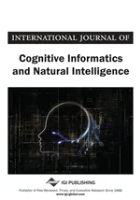
International Journal of Cognitive Informatics and Natural Intelligence
Advancing Cognitive Systems for a Smarter TomorrowThe International Journal of Cognitive Informatics and Natural Intelligence, published by IGI Global, is an essential resource for researchers and professionals exploring the intersections of cognitive informatics, artificial intelligence, and human-computer interaction. Since its establishment in 2007, this journal has focused on advancing the understanding of cognitive systems and their applications in natural intelligence, contributing significantly to the fields of software engineering and interface design. Operating out of the United States, the journal aims to disseminate high-quality research and innovative methodologies to foster interdisciplinary collaboration. Despite its current standing in Q4 quartiles for the fields of Artificial Intelligence, Human-Computer Interaction, and Software, it serves as a vital platform for emerging scholars and seasoned professionals alike seeking to explore new frontiers in cognitive technologies. While it does not provide direct open access, these publications are instrumental in shaping academic discourse, and contribute to ongoing advancements in how we understand and integrate cognitive science into practical applications.
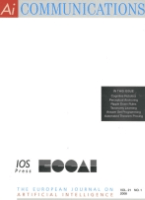
AI COMMUNICATIONS
Illuminating the Pathways of AI Research.AI COMMUNICATIONS is a distinguished journal published by IOS PRESS, focusing on the dynamic field of Artificial Intelligence. With a rich history dating back to 1987, this journal covers a broad spectrum of topics, including the latest advancements in AI methodologies, applications, and implications for society. Despite holding a Q3 classification in the 2023 category of Artificial Intelligence, it provides an essential platform for dialogue and dissemination of research, highlighted by its global accessibility in the realm of AI communications. Researchers, professionals, and students alike will find a wealth of knowledge within its pages, which aim to bridge the gap between cutting-edge research and practical applications in AI. By contributing to this journal, authors have the potential to engage with a diverse audience and impact the ongoing discourse surrounding artificial intelligence technologies.

Review of Philosophy and Psychology
Fostering Dialogue at the Intersection of Philosophy and PsychologyReview of Philosophy and Psychology, published by Springer, stands as a pivotal journal at the intersection of two influential disciplines. Operating under the ISSN 1878-5158, this esteemed publication has garnered attention since its inception in 2010, with a clear commitment to advancing the discourse in both Experimental and Cognitive Psychology and Philosophy. Notably, it has achieved impressive rankings in 2023, placing in the Q2 category for Experimental and Cognitive Psychology and Q1 category for Philosophy, further enhancing its credibility and appeal among scholars. With a notable Scopus ranking of #26 in Philosophy and #40 in Experimental Psychology, the Review of Philosophy and Psychology serves as an essential platform for the dissemination of research that equips readers with multifaceted insights and fosters interdisciplinary dialogue. While the journal maintains traditional access options, it continues to contribute significantly to its fields with high-quality articles that challenge and expand existing paradigms. As such, it is an invaluable resource for researchers, professionals, and students eager to explore and understand the nuanced relationships between philosophical inquiry and psychological research.

Teoria-Rivista di Filosofia
Cultivating Diverse Perspectives in Philosophical InquiryTeoria-Rivista di Filosofia is a distinguished academic journal published by EDIZIONI ETS, based in Pisa, Italy. With a focus on philosophical discourse, this journal is a valuable resource for researchers, professionals, and students in the field of philosophy. Having achieved a commendable Q3 ranking in the 2023 category quartiles, Teoria stands out in the competitive landscape of philosophy journals, with a Scopus rank of #612 out of 806, placing it in the 24th percentile. Although currently classified as a non-open access publication, it frequently addresses cutting-edge themes and challenges within philosophical research, promoting rigorous analysis and diverse perspectives. The journal spans various topics across multiple issues from its inception in 2011 to its ongoing publications scheduled through 2024, making it a relevant venue for contemporary philosophical inquiry. The journal aims to foster scholarly communication and stimulate critical debates, contributing significantly to the global philosophical landscape.
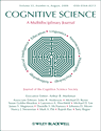
COGNITIVE SCIENCE
Charting New Territories in Human ThoughtCOGNITIVE SCIENCE, published by WILEY, is a leading academic journal that delves into the complexities of human cognition through an interdisciplinary lens. With an ISSN of 0364-0213 and an E-ISSN of 1551-6709, this journal has made significant strides in the field since its inception in 1977, ample coverage through to 2024, and a commendable Q1 and Q2 categorization in Experimental and Cognitive Psychology and Cognitive Neuroscience as of 2023. The journal is positioned at the intersection of various disciplines, ranking #65 out of 165 in Experimental and Cognitive Psychology and #58 out of 115 in Cognitive Neuroscience, highlighting its relevance and contribution to advancing knowledge in these areas. Although it does not offer open access, COGNITIVE SCIENCE remains an essential resource for researchers, professionals, and students seeking to explore groundbreaking research and theoretical insights within the vast domain of cognitive science.